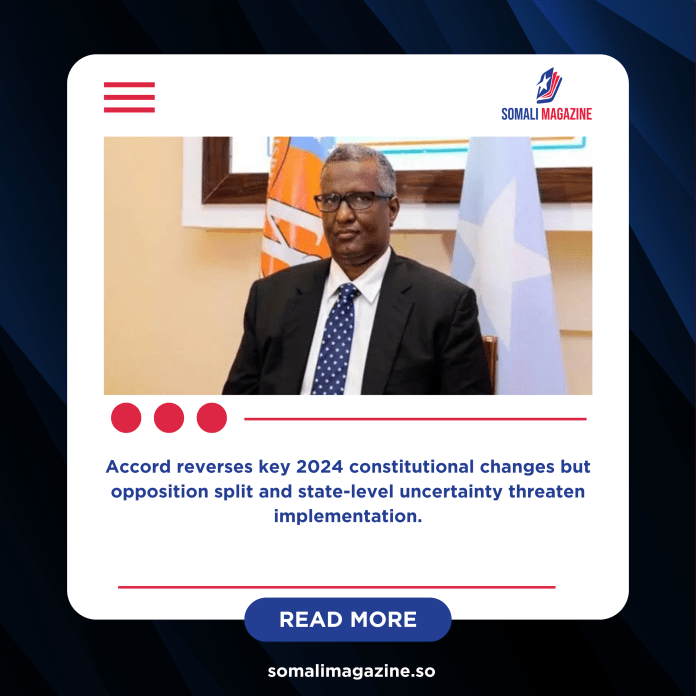Facebook Twitter (X) Instagram Somali Magazine - People's Magazine
Somalia’s federal government and part of the opposition have reached a political agreement on the country’s election process after two months of tense negotiations. The deal reverses some controversial constitutional changes passed in 2024, but deep divisions remain among opposition leaders, raising fears that the accord could prolong Somalia’s political crisis rather than resolve it.
The new framework was announced this week in Mogadishu. It rolls back several of the March 2024 constitutional amendments that had expanded presidential powers and fueled disputes between federal authorities and regional states.
Under the agreement, Somalia will return to its long-standing indirect electoral model. The Federal Parliament will elect the president, ending a push by Villa Somalia for direct presidential elections. Members of Parliament will continue to be chosen by federal member state leaders, though the deal includes a pledge to gradually transition to a “one person, one vote” system in the future.
The arrangement also restores a key check on executive power. The president will continue to appoint a prime minister, but the House of the People will again have the authority to confirm or dismiss the nominee. That parliamentary oversight had been removed in last year’s changes.
Another compromise involves the regulation of political parties. Instead of limiting the system to just two or three parties, the deal allows any political group that wins at least 10 percent of parliamentary seats to gain official national party status. Supporters of the framework describe these measures as necessary concessions designed to rebuild trust and credibility in Somalia’s democratic process.
However, the agreement has already exposed cracks within the opposition. The Somali Salvation Forum, the country’s main opposition bloc, is now split. Four senior Forum figures — former Prime Minister Omar Abdirashid Ali Sharmarke, former parliamentary speakers Sharif Hassan Sheikh Adan and Mohamed Mursal, and former Information Minister Dahir Mohamud Gelle — signed the accord with the government. But other Forum leaders have openly rejected it.
One of the strongest critics is Abdirahman Abdishakur Warsame, leader of the Wadajir Party. Speaking to the BBC, Abdishakur argued that the deal represents the personal views of those who signed it rather than the position of the Forum as a whole. He accused the government of failing to address broader concerns such as the Gedo crisis, misuse of public resources, and the continuing fight against al-Shabab. He also dismissed the president’s proposed election timeline as unrealistic, warning that the partial rollback of the amendments does not go far enough.
The divide has created two parallel tracks in the opposition camp. Those who signed the deal are preparing to brief international partners in Mogadishu. They are expected to present a timetable for implementation, request external support, and discuss plans to register a political party that could contest upcoming elections. Meanwhile, the faction that refused to endorse the accord has yet to issue an official statement but insists it will continue to oppose the government.
Adding to the uncertainty, several senior members of the Somali Salvation Forum resigned on August 24, further weakening the group’s cohesion.
Observers say that the real test for the new framework will be whether it gains acceptance from regional administrations. Puntland and Jubaland — two influential federal member states that cut ties with Mogadishu after last year’s amendments — have not yet signaled their positions. Without their cooperation, preparations for national elections could face serious delays.
Another unresolved issue is the length of government terms. The 2024 amendments extended terms from four years to five, but the new deal does not clearly state whether that extension still applies. Analysts expect this sensitive matter to be clarified in the coming months.
While the agreement represents a step back from the political brink, it is far from a final settlement. Supporters call it a hard-won compromise that salvages Somalia’s democratic process, but critics see it as incomplete and potentially destabilizing. Unless consensus is built among federal and regional leaders, Somalia risks facing yet another prolonged period of political uncertainty.

